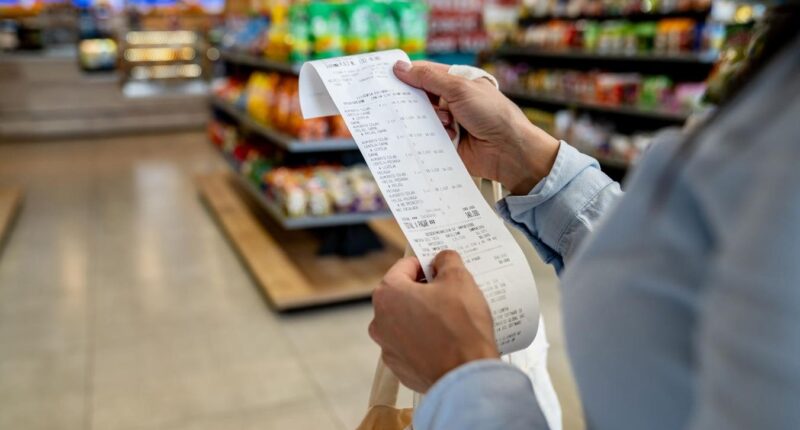Share this @internewscast.com
Close-up on a woman shopping at a convenience store and checking her receipt while exiting
getty
In survey after survey, consumers overwhelmingly expect Trump’s tariffs to increase prices, a view reinforced by numerous experts, including the Federal Reserve’s Jerome Powell, who said in June, “Everyone that I know is forecasting a meaningful increase in inflation in coming months from tariffs.”
Despite June reports that the consumer price index only ticked up 0.3%, which Goldman Sachs’ Kay Haigh said “remained muted,” and that the producer price index, which measures wholesale price increases, didn’t move at all, consumers aren’t reassured.
They see prices rising before their eyes, which is backed up by findings from Harvard Business School’s Pricing Lab, which tracks prices from four major U.S. retailers on a daily basis. The July 17 report found prices on both imported and domestic goods are going up.
As consumers try to reconcile conflicting reports and what their “lying eyes” are seeing, a new Harris Poll report suggests they are going to point the finger not on distant government officials in Washington, but closer to home: on retailers and brands they regularly do business with.
Corporate Greed Takes Blame
“Sixty-three percent of Americans believe that companies are taking advantage of the economic climate to boost profits,” said Harris Poll CEO John Gerzema, based upon a recent survey among 2,000 adult Americans. Further, 62% believe businesses are lowering product quality while raising prices, another blow to corporate reputations and a threat to brand loyalty.
Retailers must tread carefully in these rough waters. Consumers will do business with brands they trust. The widespread feeling is that corporations are putting profits ahead of the people they serve.
“Consumers must be able to trust that businesses are not taking advantage of them during this period of high economic anxiety,” Gerzema continued. “Those who demonstrate themselves as allies right now will build future differentiation and goodwill.”
An additional threat to customer loyalty was uncovered in a related Axios/Harris Poll earlier this year. More Americans – 39% – hold businesses accountable for their financial struggles compared to 30% who blame government policies. Meanwhile, another 30% cite their own financial decisions for their economic hardships. These consumers are likely to change their shopping behavior in an effort to regain control and correct course.
Businesses Have A Choice
Even as the Pricing Lab finds domestic retail prices going up, the increased tariff rates that are set to take effect on Aug. 1 are going to be a bigger blow and one that will put even greater stress on consumers and corporations that have to decide how to cover them. The Budget Lab at Yale just reported that consumers face an overall average effective tariff rate of 20.6%, the highest since 1910.
The Federal Reserve Bank of New York posted a report in June that 75% of manufacturers have started to pass through tariff costs to consumers, including nearly one-third that have passed along all associated tariffs, greater than the 25% that have held prices steady. In the middle, 24% have passed on 50% or less of tariff costs and 20% are in the range between 51% and 99%.
Manufacturers also indicated that the cost of their tariffs goods increased by an average of 20% over the last six months, a pretty sizeable markup and inline with the Budget Lab’s assessment.
For retailers and their product partners, Gerzema advised caution in passing along too many of the tariff costs. “It’s a question of whose side are you on? With tariffs creating greater uncertainty and price sensitivity, leaders must explain how their business is responding and the steps they are taking to protect future customer value, not just margin.”
Somebody’s Got To Pay
Drawing on insights from the Harris Poll, Gerzema encourages companies to adopt a fair and transparent approach to pricing. When price hikes are unavoidable, he advises clear, empathetic communication to maintain trust and goodwill.
In cases where tariffs drive up costs, a “less is more” philosophy applies—businesses are better served by absorbing a portion of the impact rather than transferring the full burden to consumers.
As the Fed’s Powell said, “All through that [supply] chain, people will be trying not to be the ones who can take up the cost, but ultimately, the cost of the tariff has to be paid. And some of it will fall on the end consumer.”








